have-与-have-got区别
have和havegot的用法区别

have和havegot的用法区别have 作某些意义时,与have got 通用,have got 是英国英语。
一、两者在肯定句、否定句和疑问句中的形态不一样1、肯定句have: 主语+ have/hashave got: 主语+ have got ('ve got) / has got ('s got)2、否定句have: 主语+ do not (don't) / does not (doesn't) + havehave got: 主语+ have not (haven't) / has not (hasn't)3、一般疑问句have: Do / Does + 主语+ have?have got: Have / has + 主语+ got?二、两者的共同意义,此时两者通用1、讨论拥有的东西,意为“有,持有,占有”,通常不用进行时,例如:I have/have got a new mobile phone.我有一部新手机。
Paul doesn’t have/hasn’t got a car.保罗没有汽车。
2、讨论与别人的关系,意为“有”,通常不用进行时,例如:Jane has/has got a brother.简有一个哥哥。
He has/has got three children.他有三个孩子。
3、讨论性质,特征,意为“显示出,带有”,通常不用进行时,例如:She has/has got blue eyes.她有一双蓝眼睛。
The house has/has got gas-fired central heating.这所房子有燃气中央供暖系统。
4、讨论生病或暂时的状态,意为“患…,有…”,通常不用进行时,例如:I have/ I’ve got a cold.我感冒了。
They have/have got a problem.他们有麻烦了。
have_got的详细用法

复习:have的用法及否定句、一般疑问句的变法。
①have的意思是:________,它的单数形式是:_______。
have是_______词。
例如:我有许多好朋友。
_____ _____ many good friends.他有许多好朋友。
_____ _____ many good friends.②把下列两道题改为否定句:1、I have many good friends:_____________________________总结:have 的句子改为否定句要_______________________________________________________________2、He has a dog:_________________________ 总结:has的句子改为否定句要_____________________________________ 同样的道理:请将下列两道题改为一般疑问句:I have many good friends:_____________________________ 总结:______________________________________He has a dog:_________________________ 总结:________________________________________________________练习:一、用have的正确形式填空:1、He_____two brothers.2、I_____a beautiful picture.3、Betty_____ a lovely dog.4、They_____some friends here.二、请将下列的句子改为否定句和一般疑问句。
1-3题改为否定句:1、He has two brothers. ___________________________________________________2、I have a beautiful picture. ___________________________________________________3、Betty has some friends here. ___________________________________________________4-6题改为一般疑问句: 4、They have a good teacher. _________________________________肯定回答:_________________5、I have some cards. __________________________________________否定回答:____________________6、Tony has a sister. __________________________________________否定回答:____________________三、请用所给词的适当形式填空。
have和have got和there be 等相近词的辨析
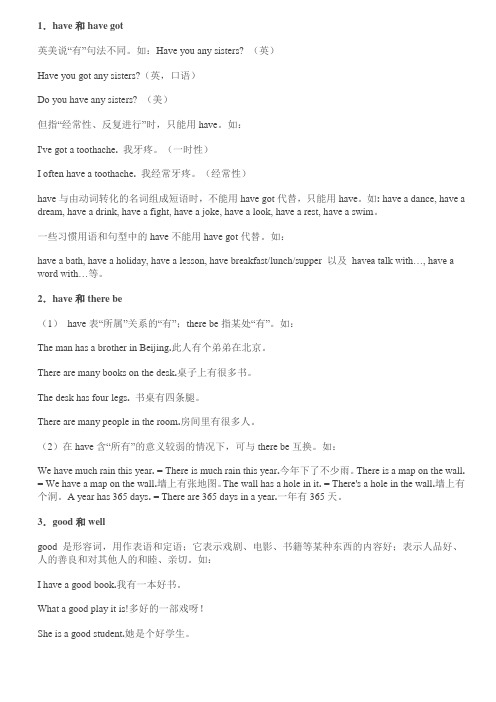
1.have和have got英美说“有”句法不同。
如:Have you any sisters? (英)Have you got any sisters?(英,口语)Do you have any sisters? (美)但指“经常性、反复进行”时,只能用have。
如:I've got a toothache.我牙疼。
(一时性)I often have a toothache.我经常牙疼。
(经常性)have与由动词转化的名词组成短语时,不能用have got代替,只能用have。
如: have a dance, have a dream, have a drink, have a fight, have a joke, have a look, have a rest, have a swim。
一些习惯用语和句型中的have不能用have got代替。
如:have a bath, have a holiday, have a lesson, have breakfast/lunch/supper 以及havea talk with…, have a word with…等。
2.have和there be(1)have表“所属”关系的“有”;there be指某处“有”。
如:The man has a brother in Beijing.此人有个弟弟在北京。
There are many books on the desk.桌子上有很多书。
The desk has four legs.书桌有四条腿。
There are many people in the room.房间里有很多人。
(2)在have含“所有”的意义较弱的情况下,可与there be互换。
如:We have much rain this year. = There is much rain this year.今年下了不少雨。
have与have got的用法

have与have got的用法Have与Have Got的用法Have和Have got都是表示“有”的意思,但在使用上有一些区别。
1. HaveHave是一个常规的动词,表示拥有或持有某物。
它可以用于各种时态和语态,如:- 现在时:I have a car.(我有一辆车。
)- 过去时:She had a headache yesterday.(她昨天头疼。
)- 将来时:We will have a party next week.(我们下周要开派对。
)- 现在完成时:He has finished his homework.(他已经完成了作业。
) - 被动语态:The book has been read by many people.(这本书被很多人读过。
)2. Have gotHave got是have的口语形式,通常只用于现在时态。
它的意思与have相同,但有时会强调拥有某物的事实。
例如:- I have got a new phone.(我有一部新手机。
)- She has got a lot of friends.(她有很多朋友。
)- Have you got any money?(你有钱吗?)注意:在英式英语中,have got也可以用于过去时和将来时,但在美式英语中不常用。
3. 区别虽然have和have got的意思相同,但在使用上有一些区别:- Have got通常只用于口语,而have可以用于口语和书面语。
- Have got强调拥有某物的事实,而have则没有这种强调。
- Have got不能用于进行时态,而have可以。
例如:I am having a good time.(我正在度过愉快的时光。
)4. 常见用法除了表示“有”之外,have和have got还有一些常见的用法:- Have a good time.(玩得愉快。
)- Have a look.(看一看。
)- Have a seat.(请坐。
动词have的用法规则总结

动词have的用法规则总结一、have的常见用法及规则1. 表示拥有或具备某种物品或特征- 表示物品的拥有:I have a car.- 表示个人特征:She has blue eyes.2. 表示经历、感受或经受某种情绪- 经历:We had a great time at the party.- 感受:He had a feeling of excitement.- 经受情绪:She had a panic attack.3. 表示进行或完成某项活动、行动或任务- 进行活动:They have lunch together every day.- 完成任务:I have finished my homework.4. 表示发生在过去的事件- 过去事件:They had an argument yesterday.5. 用于构成某些固定表达和习语- Have a good day!- I have my doubts about his story.二、have的时态和形式变化1. 现在时:- 肯定句:I/we/you/they/he/she/it + have + 名词或不定式(原形)- 否定句:I/we/you/they/he/she/it + do not/don't + have + 名词或不定式(原形)- 疑问句:Do + I/we/you/they/he/she/it + have + 名词或不定式(原形)?2. 过去时:- 肯定句:I/we/you/they/he/she/it + had + 名词或不定式(原形)- 否定句:I/we/you/they/he/she/it + did not/didn't + have + 名词或不定式(原形)- 疑问句:Did + I/we/you/they/he/she/it + have + 名词或不定式(原形)?3. 将来时:- 肯定句:I/we/you/they/he/she/it + will/shall/shan't + have + 名词或不定式(原形)- 否定句:I/we/you/they/he/she/it + will not/won't/shan't + have+ 名词或不定式(原形)- 疑问句:Will/Shall + I/we/you/they/he/she/it + have+ 名词或不定式(原形)?4. 完成时:表示过去的已完成动作,并对现在造成影响。
have_got的详细用法

复习:have的用法及否定句、一般疑问句的变法。
①have的意思是:________,它的单数形式是:_______。
have是_______词。
例如:我有许多好朋友。
_____ _____ many good friends.他有许多好朋友。
_____ _____ many good friends.②把下列两道题改为否定句:1、I have many good friends:_____________________________总结:have 的句子改为否定句要_______________________________________________________________2、He has a dog:_________________________ 总结:has的句子改为否定句要_____________________________________ 同样的道理:请将下列两道题改为一般疑问句:I have many good friends:_____________________________ 总结:______________________________________He has a dog:_________________________ 总结:________________________________________________________练习:一、用have的正确形式填空:1、He_____two brothers.2、I_____a beautiful picture.3、Betty_____ a lovely dog.4、They_____some friends here.二、请将下列的句子改为否定句和一般疑问句。
1-3题改为否定句:1、He has two brothers. ___________________________________________________2、I have a beautiful picture. ___________________________________________________3、Betty has some friends here. ___________________________________________________4-6题改为一般疑问句: 4、They have a good teacher. _________________________________肯定回答:_________________5、I have some cards. __________________________________________否定回答:____________________6、Tony has a sister. __________________________________________否定回答:____________________三、请用所给词的适当形式填空。
have 与 have got区别
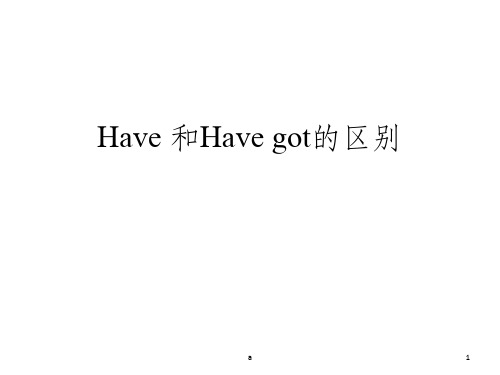
a
16
Passive
被动语态
a
17
一:英语的谓语动词有两种语态
We speak
主语
谓语
English.
宾语
主动语态
English is spoken by us.
主语
谓语
宾语
宾变主,主变宾,前加by
a
13
• 4.在问对方是否愿意或表示客气的邀请或 命令时,常用will。
Will you go to see a film with us? 你愿意和我们一起去看电影吗? 5.表示不以人们的意志为转移的规律。
He is fourteen this year, and he will be fifteen next year. 他今年十四岁,明年十五岁。
• Li Hong had a problem yesterday. • I have had the bike for three years.
a
5
固定短语中不能用Have/has got
Have breakfast/ lunch/dinner/supper Have a cup of tea/ coffee/ cigarette Have a bath/ a shower/ a swim/ a rest Have a party/ a holiday/ a nice time Have an accident/ an experience Have a look/ a chat/ a baby Have difficulty/ trouble/ fun
I am going to meet Tom at the station at six. 我六点钟要到火车站去接汤姆。
have_got的详细用法

复习:复习:have have 的用法及否定句、一般疑问句的变法。
的用法及否定句、一般疑问句的变法。
①have 的意思是:的意思是:________________________,它的单数形式是:,它的单数形式是:,它的单数形式是:_____________________。
have 是______________词。
词。
词。
例如:我有许多好朋友。
例如:我有许多好朋友。
_____ _____ many good friends._____ _____ many good friends._____ _____ many good friends.他有许多好朋友。
他有许多好朋友。
他有许多好朋友。
_____ _____ many good friends. _____ _____ many good friends. ②把下列两道题改为否定句:②把下列两道题改为否定句:1、I have many good friends I have many good friends::_____________________________总结:总结:have have have 的句子改为否定句要的句子改为否定句要的句子改为否定句要_______________________________________________________________ _______________________________________________________________2 2、、He has a dog dog::_________________________ _________________________ 总结:总结:has 的句子改为否定句要的句子改为否定句要_____________________________________ _____________________________________ 同样的道理:请将下列两道题改为一般疑问句:同样的道理:请将下列两道题改为一般疑问句:I have many good friends I have many good friends::_____________________________ _____________________________ 总结:总结:总结:______________________________________ ______________________________________ He has a dog He has a dog::_________________________ _________________________ 总结:总结:总结:________________________________________________________ ________________________________________________________ 练习:一、用have 的正确形式填空:1、He_____two brothers.2、I_____a beautiful picture.3、Betty_____ a lovely dog.4、They_____some friends here.二、请将下列的句子改为否定句和一般疑问句。
have to与 have got to的区别
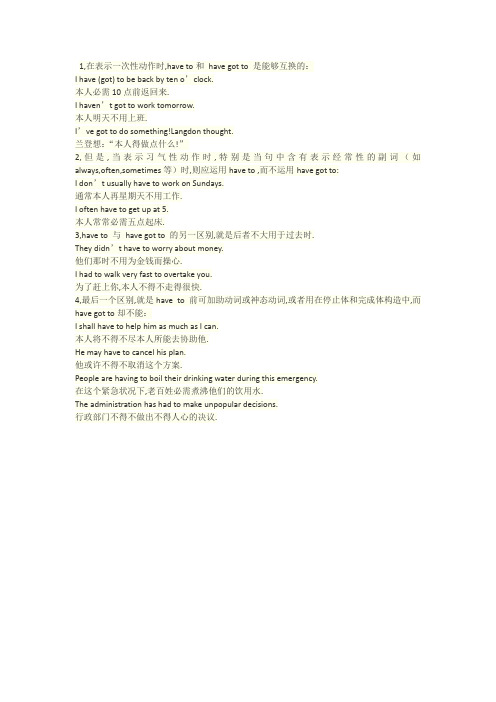
1,在表示一次性动作时,have to和have got to 是能够互换的:I have (got) to be back by ten o’clock.本人必需10点前返回来.I haven’t got to work tomorrow.本人明天不用上班.I’ve got to do something!Langdon thought.兰登想:“本人得做点什么!”2,但是,当表示习气性动作时,特别是当句中含有表示经常性的副词(如always,often,sometimes等)时,则应运用have to ,而不运用have got to:I don’t usually have to work on Sundays.通常本人再星期天不用工作.I often have to get up at 5.本人常常必需五点起床.3,have to 与have got to 的另一区别,就是后者不大用于过去时.They didn’t have to worry about money.他们那时不用为金钱而操心.I had to walk very fast to overtake you.为了赶上你,本人不得不走得很快.4,最后一个区别,就是have to 前可加助动词或神态动词,或者用在停止体和完成体构造中,而have got to却不能:I shall have to help him as much as I can.本人将不得不尽本人所能去协助他.He may have to cancel his plan.他或许不得不取消这个方案.People are having to boil their drinking water during this emergency.在这个紧急状况下,老百姓必需煮沸他们的饮用水.The administration has had to make unpopular decisions.行政部门不得不做出不得人心的决议.。
英语have与have got的区别

*(一)、have与have got:建议查看《英语用法指南》(Practical English Usage, Michael Swan 著)第241条目have, have got表示占有,相互关系和其他状态实际上这涉及到have动词的三种用法,作助动词,作实义动词单用,以及have got。
虽然他们意思相同,但是用法存在一定差别(特别是地域性差别)一般来说,我们避免直接使用have形式(原文:“这看起来不自然”)在十分正式的英国英语里面,还可以使用Have you sth.?以及I haven't sth. ,这在美国英语是绝对不出现的。
在非正式文体中,have got更好但是have got形式不经常用在其他时态,比如I had got ,I will have got都比较少见。
但是可以与情态动词合用:She must have got a nice present.当我们表达重复性动作的时候,使用do+have的形式,而不是have got以上的用法以英国英语为标准。
如果在美国英语里面,do+have几乎是最常用的形式,口语中则会出现have got。
不过随着时间的推移,美国英语对英国英语影响越来越大,现在do+have的形式也经常被使用。
have和have got的区别尤其是在疑问句和否定句方面一、在英语口语中,常用have got 代替have ,作“有”解。
I have a bike. = I have got a bike.1.其否定式为:I don’t have a bike. = I haven’t a bike.I haven’t got a bike. (√)I don’t have got a bike. (×)2.其疑问形式为:Have you a bike? / Have you got a bike?Do you have a bike? (√)Do you have got a bike? (×)二、在下列情况下不能用have got来代替have。
have与have got区别
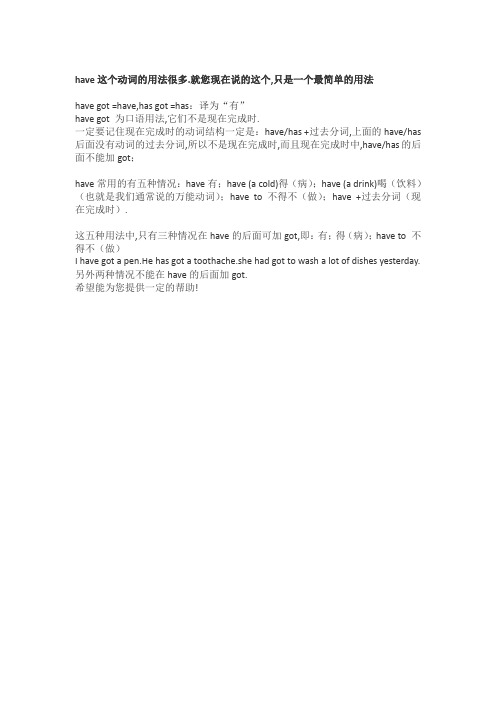
have这个动词的用法很多.就您现在说的这个,只是一个最简单的用法
have got =have,has got =has:译为“有”
have got 为口语用法,它们不是现在完成时.
一定要记住现在完成时的动词结构一定是:have/has +过去分词,上面的have/has 后面没有动词的过去分词,所以不是现在完成时,而且现在完成时中,have/has的后面不能加got;
have常用的有五种情况:have有;have (a cold)得(病);have (a drink)喝(饮料)(也就是我们通常说的万能动词);have to 不得不(做);have +过去分词(现在完成时).
这五种用法中,只有三种情况在have的后面可加got,即:有;得(病);have to 不得不(做)
I have got a pen.He has got a toothache.she had got to wash a lot of dishes yesterday. 另外两种情况不能在have的后面加got.
希望能为您提供一定的帮助!。
have_got的详细用法

复习:have 的用法及否定句、一般疑问句的变法。
① have 的意思是: ________ ,它的单数形式是: ________。
have 是 ________ 词。
例如:我有许多好朋友。
_____________ ma ny good frien ds. 他有许多好朋友。
_____________ ma ny good frien ds.② 把下列两道题改为否定句:1、I have many good friends : ________________________________总结:have 的句子改为否定句要 _______________________________________________________________________2、Hehas a dog : ___________________________ 总结:has 的句子改为否定句要 __________________________________________ 同样的道理:请将下列两道题改为一般疑问句:I have many good friends : _________________________________ 总结: __________________________________________ He has a dog : ___________________________ 总结: ______________________________________________________________ 练习:一、用have 的正确形式填空: 1、 ________ H etwo brothers. _ 3、Betty a lovely dog. 2、 I ___ a beautiful picture.4、They _____ some friends here.二、请将下列的句子改为否定句和一般疑问句。
have 与 have got区别(课堂PPT)

21
6
Future
将来时态
7
一般将来时表示在将来某个时间 要发生的动作或存在的状态
• 一、be going to+动词原形 • 1.表示打算在最近或将来要做某事。这种
打算往往是事先考虑好的。如: My brother is going to learn English next year. 我哥哥准备明年学英语。 I am going to meet Tom at the station at six. 我六点钟要到火车站去接汤姆。
11
• 二、Will +动词原形 Will 可用于任何人称(口语中)
1.表示主动愿意或要求去做某事 The bag looks heavy. I’ ll help you with it.
12
• 2.表示预料中将要发生的动作或情况。 You’ll feel better after having this medicine. 吃了这药,你就会感到好些的。
8
• 2.表示说话人根据已有的迹象认为非常可 能即将发生某事。如: Look at these black clouds——it is going to rain. 看这些乌云——要下雨了。 I’m afraid I’m going to have a bad cold. 恐怕我要得重感冒了。
9
• 注意: • 1. 如果be going to后接的是形容词或副词
• 3.will表示人的主观意愿,它带有浓厚的 感情色彩。 Come earlier tomorrow, or I won’t let you in. 明天早点儿来,否则我不让你进来。
英语have与have_got区别
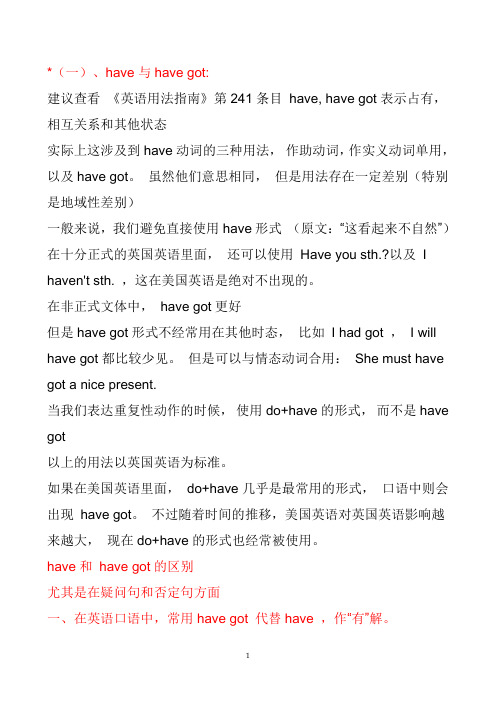
*(一)、have与have got:建议查看《英语用法指南》第241条目have, have got表示占有,相互关系和其他状态实际上这涉及到have动词的三种用法,作助动词,作实义动词单用,以及have got。
虽然他们意思相同,但是用法存在一定差别(特别是地域性差别)一般来说,我们避免直接使用have形式(原文:“这看起来不自然”)在十分正式的英国英语里面,还可以使用Have you sth.?以及I haven't sth. ,这在美国英语是绝对不出现的。
在非正式文体中,have got更好但是have got形式不经常用在其他时态,比如I had got ,I will have got都比较少见。
但是可以与情态动词合用:She must have got a nice present.当我们表达重复性动作的时候,使用do+have的形式,而不是have got以上的用法以英国英语为标准。
如果在美国英语里面,do+have几乎是最常用的形式,口语中则会出现have got。
不过随着时间的推移,美国英语对英国英语影响越来越大,现在do+have的形式也经常被使用。
have和have got的区别尤其是在疑问句和否定句方面一、在英语口语中,常用have got 代替have ,作“有”解。
I have a bike. = I have got a bike.1.其否定式为:I don’t have a bike. = I haven’t a bike.I haven’t got a bike. (√)I don’t have got a bike. (×)2.其疑问形式为:Have you a bike? / Have you got a bike?Do you have a bike? (√)Do you have got a bike? (×)二、在下列情况下不能用have got来代替have。
have got 句型用法 详解

have got句型用法详解表示某地有某人/某物,我们用“there be ”句型,而表示某人有某物,可以用have/has got句型,它表示某物归某人所有,是一种所属关系,主语为人。
一、常见句式:1、否定句:在Have或Has后加not,缩写为haven’t或hasn’t.I have got a dog.I have not got a dog.2、疑问句:把have或has提前,注意首字母需要大写。
We have got a brother.Have we got a brother?回答为: 肯定Yes,we have.否定No,we haven’t.二、与have/has的互相转换:转换:have got=have has got=has1、在只含有have的句子中,变否定句在have前加don’t,其余不变.变疑问句在句首加Do,其余不变.I have a bike.=I have got a bike.否定句:I don’t have a bike.=I haven’t got a bike.疑问句:Do you have a bike?=Have you got a bike?2、在只含有has的句子中,变否定句在has前加doesn’t,has变成have.变疑问句在句首加Does,has变成have.He has a lot of friends. = He has got a lot of friends.否定句:He doesn’t have a lot of friends. = He hasn’t got a lot of friends.疑问句:Dose he have a lot of friends? = Has he got a lot of friends?三、在下列情况下不能用have got来代替have。
1. 在情态动词,助动词或动词不定式之后,只能用have,不用have got。
have 和 have got 的用法区别
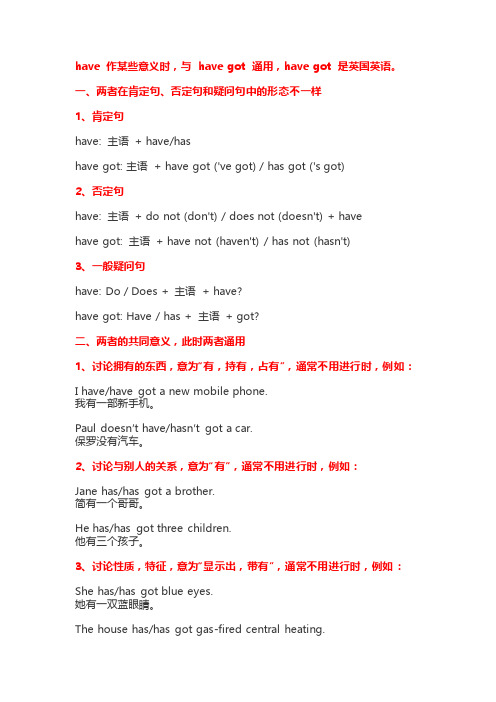
have 作某些意义时,与have got 通用,have got 是英国英语。
一、两者在肯定句、否定句和疑问句中的形态不一样1、肯定句have: 主语+ have/hashave got: 主语+ have got ('ve got) / has got ('s got)2、否定句have: 主语+ do not (don't) / does not (doesn't) + havehave got: 主语+ have not (haven't) / has not (hasn't)3、一般疑问句have: Do / Does + 主语+ have?have got: Have / has + 主语+ got?二、两者的共同意义,此时两者通用1、讨论拥有的东西,意为“有,持有,占有”,通常不用进行时,例如:I have/have got a new mobile phone.我有一部新手机。
Paul doesn’t have/hasn’t got a car.保罗没有汽车。
2、讨论与别人的关系,意为“有”,通常不用进行时,例如:Jane has/has got a brother.简有一个哥哥。
He has/has got three children.他有三个孩子。
3、讨论性质,特征,意为“显示出,带有”,通常不用进行时,例如:She has/has got blue eyes.她有一双蓝眼睛。
The house has/has got gas-fired central heating.这所房子有燃气中央供暖系统。
4、讨论生病或暂时的状态,意为“患…,有…”,通常不用进行时,例如:I have/ I’ve got a cold.我感冒了。
They have/have got a problem.他们有麻烦了。
三、两者的区别1、用have 而不用have got 讨论我们做的事,比如吃饭,度假等,常跟名词a bath、a shower 或a wash,例如:I have a cup of coffee at seven o’clock.我七点钟喝杯咖啡。
have的用法及否定句、一般疑问句的变法

复习:have的用法及否定句、一般疑问句的变法。
① have的意思是:________,它的单数形式是:_______。
have是_______词。
② 例如:我有许多好朋友。
_____ _____ many good friends.③ 他有许多好朋友。
_____ _____ many good friends.②把下列两道题改为否定句:1、I have many good friends:_____________________________总结:have 的句子改为否定句要_______________________________________________________________2、He has a dog:_________________________总结:has的句子改为否定句要_____________________________________同样的道理:请将下列两道题改为一般疑问句:I have many good friends:_____________________________总结:______________________________________He has a dog:_________________________总结:________________________________________________________练习:一、用have的正确形式填空:1、He_____two brothers.2、I_____a beautiful picture.3、Betty_____ a lovely dog.4、They_____some friends here.二、请将下列的句子改为否定句和一般疑问句。
1-3题改为否定句:1He has two brothers.2、I have a beautiful picture.3、Betty has some friends here.4-6题改为一般疑问句:4、They have a good teacher. _________________________________肯定回答:_________________5、I have some cards. __________________________________________否定回答:____________________6、Tony has a sister. __________________________________________否定回答:____________________三、请用所给词的适当形式填空。
- 1、下载文档前请自行甄别文档内容的完整性,平台不提供额外的编辑、内容补充、找答案等附加服务。
- 2、"仅部分预览"的文档,不可在线预览部分如存在完整性等问题,可反馈申请退款(可完整预览的文档不适用该条件!)。
- 3、如文档侵犯您的权益,请联系客服反馈,我们会尽快为您处理(人工客服工作时间:9:00-18:30)。
Exercise:
He rides the motorbike to his factory every day.
The motorbike is ridden to his factory every day.
• 3.will表示人的主观意愿,它带有浓厚的 感情色彩。
Come earlier tomorrow, or I won’t let you in. 明天早点儿来,否则我不让你进来。
• 4.在问对方是否愿意或表示客气的邀请或 命令时,常用will。
Will you go to see a film with us? 你愿意和我们一起去看电影吗? 5.表示不以人们的意志为转移的规律。
They make shoes in that factory.
Shoes are made by them in that factory. were
被动语态的大体构成: Be + PP(过去分词)
主动语态变被动之歌:
被动语态强调宾,be后加上过去分。 Be要随着主语变,人称时态要弄准。 行为对象作主语, 逻辑主语by来引。
• 注意:
• 1. 如果be going to后接的是形容词或副词 (there)时,其后应加上be,然后再接形容 词或副词。
I’m going to be busy this Sunday.
这个星期天我很忙
• 2. there be句型也可用于这种句型中,但 there不能和have连用。
There is going to be an English film this evening. 今天晚上有一场英文电影。
• 注意 Have / has got 没有时态的变化,只能用于 一般现在时,不能用于完成时,过去式和 将来时等时态
• Li Hong had a problem yesterday. • I have had the bike for three years.
固定短语中不能用Have/has got
I am going to meet Tom at the station at six. 我六点钟要到火车站去接汤姆。
• 2.表示说话人根据已有的迹象认为非常可 能即将发生某事。如:
Look at these black clouds——it is going to rain. 看这些乌云——要下雨了。 I’m afraid I’m going to have a bad cold. 恐怕我要得重感冒了。
Passive
被动语态
一:英语的谓语动词有两种语态
We speak
主语
谓语
English.
宾语
主动语态
English is spoken 主变宾,前加by
主变被解题步骤:
1. 找宾语 ----即动作的承受者 2. 判断宾语的单复数 ----即be动词的单复数. 3. 判断动词的时态 ----即be动词的时态. 4. 将原句动词改为过去分词 5. 修改原句的主语 ----即by+ 主语/ 宾语.
Have breakfast/ lunch/dinner/supper Have a cup of tea/ coffee/ cigarette Have a bath/ a shower/ a swim/ a rest Have a party/ a holiday/ a nice time Have an accident/ an experience Have a look/ a chat/ a baby Have difficulty/ trouble/ fun
He is fourteen this year, and he will be fifteen next year. 他今年十四岁,明年十五岁。
• 二、Shall+动词原形 Shall 用于第一人称 表示建议或征求对方的意见。
Shall we go at eight? 我们八点去好吗? I shall go now.
Future
将来时态
一般将来时表示在将来某个时间要 发生的动作或存在的状态
• 一、be going to+动词原形 • 1.表示打算在最近或将来要做某事。这种
打算往往是事先考虑好的。如:
My brother is going to learn English next year. 我哥哥准备明年学英语。
• 二、Will +动词原形 Will 可用于任何人称(口语中)
1.表示主动愿意或要求去做某事 The bag looks heavy. I’ ll help you with it.
• 2.表示预料中将要发生的动作或情况。 You’ll feel better after having this medicine. 吃了这药,你就会感到好些的。
Have 和Have got的区别
二者都是“有”“拥有”的含义
• We have got a new car. We have a new car.
She has got a stomachache. She has a stomachache.
二者的否定和疑问不同
• Have 的否定 don’t / doesn’t have I don’t have a car.
Will 和be going to 区别
1. be going to 表示根据某种迹象,将来肯定 发生的事情,而 will 则没有这个意思 He is seriously ill. He is going to die.
2. be going to 含有“计划,准备”的意思,而 will 则没有这个意思 P 46 A
Have 的疑问 Do /Does + 主语+have+其他+? Do you have a car?
• Have/ has got 的否定 主语+haven’t(hasn’t) got +其他 I haven’t got any money.
Have/ has got 的疑问 Have/ Has+主语+got +其他? Have you got any money?
